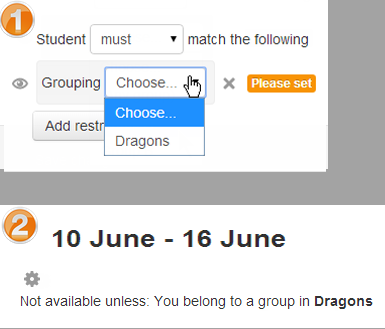Contents
- 1 What is a grouping?
- 1.1 Grouping example
- 2 Adding groups to a grouping
- 3 Setting the default grouping
- 4 Selecting a grouping for an activity
- 5 Restricting an activity, resource or course topic to a grouping
- 6 See also
What is a grouping?
A grouping is a collection of groups within a course. Using groupings allows you to direct tasks at one or more groups in your course, so that they can work together on the tasks.
Grouping example
- You teach students in a course called 'The Art of Language'.
- Your students are divided into four groups, Listening, Reading, Speaking and Writing, and for much of the course they work in these groups.
- You wish the students to work on a project, exploring passive and active language. You create a grouping Passive Language and assign the Listening and Reading groups to this grouping. You create a grouping Active Language and assign the Speaking and Writing groups to this grouping.
- Using the Restrict access feature you set certain tasks only for the Passive Language grouping and other tasks only for the Active Language grouping.
- Now the groups can work together, within their grouping, on their respective focus areas.
- At the end of the project you can bring the groups together in an activity for all participants to share their learning.
Adding groups to a grouping
To add groups to a grouping:
- In your course, click Administration > Course administration > Users > Groups.
- Click the groupings tab.
- If necessary, create a new grouping by clicking the create grouping button on the groupings page. An optional grouping ID number (an advanced setting) may be added for matching the grouping against external systems. Grouping ID numbers are not displayed anywhere on the site. Within a course, all grouping ID numbers must be unique.
- Click the "Show groups in grouping" people icon in the edit column.
- On the add/remove groups page, select the group(s) you want to add to the grouping from the "Potential members" list.
- Click the arrow button that points towards the "Existing members" list.
- Click the "Back to groupings" button. The group(s) you added to the grouping will now be listed in the table on the groupings page.
Existing groupings can be edited and/or deleted using the appropriate icons in the edit column of the table on the groupings page.
Setting the default grouping
Once some groupings have been created, a default grouping for course activities and resources may be set.
- Follow the settings link in the course administration block.
- In the groups section in the course settings, select the default grouping.
The default grouping is used on the Participants page.
Selecting a grouping for an activity
To use a particular grouping in an activity:
- Click the 'Edit settings' link for the activity
- In the common module settings section, set a group mode
- Select the grouping from the grouping dropdown menu.
- Click the "Save changes" button at the bottom of the page.
If the group mode is set to separate groups, students will only see the activities they have been assigned to. Teachers will see the name of the grouping in brackets after the activity name on the course page. A count of activities assigned to each grouping is kept on the groupings page.
Please note that the grouping option appears by default only in activities that support group modes.

If Conditional activities are enabled, there is a button 'Add group/grouping access restriction'.
Restricting an activity, resource or course topic to a grouping
To be able to restrict an activity, resource or course topic to a grouping, Restrict access must be enabled. This will result in a 'Restrict access' section in the activity, resource or topic settings and a grouping restriction can then be added.

